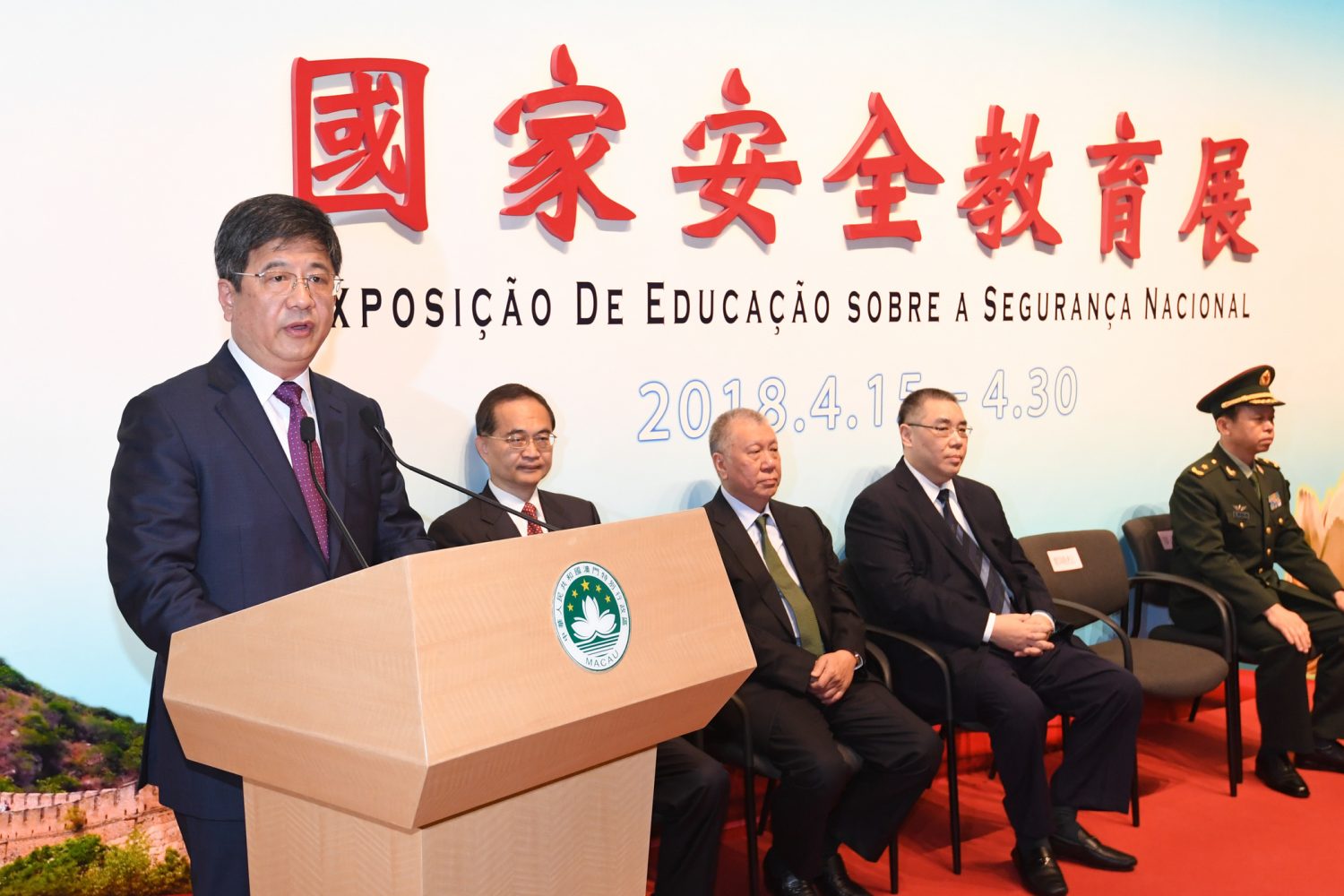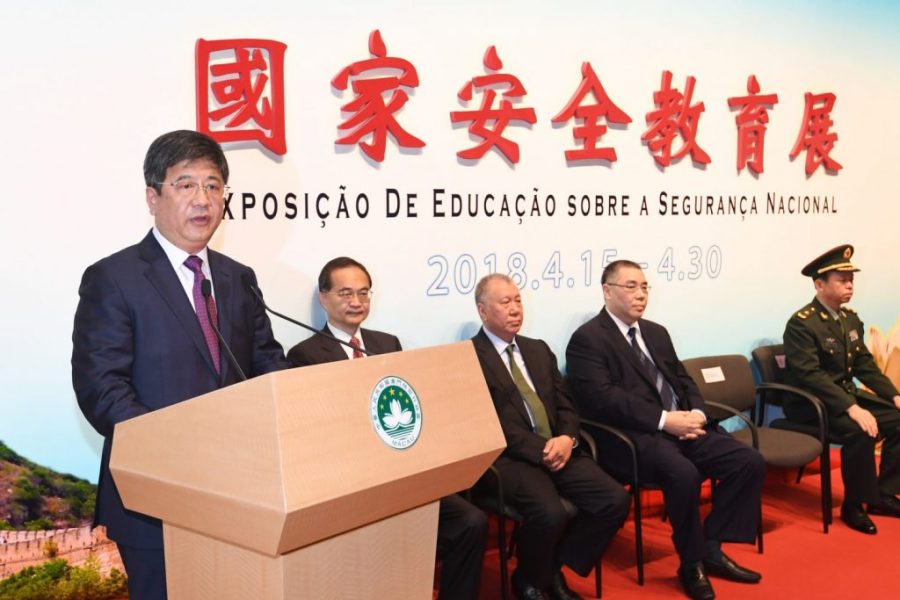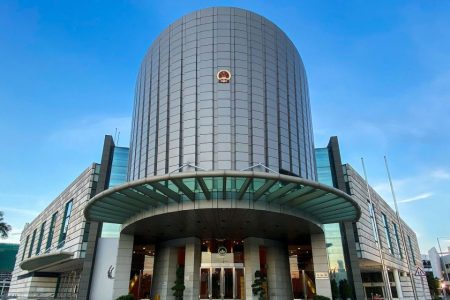Central People’s Government Liaison Office in Macau Director Zheng Xiaosong on Sunday urged Macau to improve its legal system for ensure the more effective enforcement of the local national security law.
Zheng made the remarks in a speech during the opening ceremony of the “National Security Education Exhibition” at the Macau Handover Gifts Museum in Nape.
The exhibition, which will end on April 30, is Macau’s first-ever exhibition aiming to increase residents’ awareness of the protection of national security.
According to the Macau Post Daily, the exhibition, jointly hosted by the local government and the liaison office, aims to promote understanding of the overall national security outlook outlined by President Xi Jinping, apart from demonstrating the ongoing efforts and achievements made by the local government for the protection of national security.
In his speech, Zheng noted that Sunday (April 15) was National Security Education Day as stipulated by the country’s National Security Law.
The Standing Committee of the National People’s Congress (NPC) passed the new National Security Law in July 2015. The previous National Security Law, which took effect in 1993, was abolished in 2014 when the country’s Counter-espionage Law was promulgated.
Zheng said that the Macau Special Administrative Region (MSAR) – as a local administrative region of the country enjoying a high degree of autonomy – has the “constitutional” duty to protect national security in accordance with the nation’s Constitution and the Macau Basic Law. He added that “every single” resident in Macau also has the responsibility and duty to protect national security.
Zheng noted that Macau enacted the Law on the Defence of National Security in 2009 to fulfil the Article 23 requirement of the Macau Basic Law, adding that the local law on national security has provided an institutional guarantee for the safeguarding of the country’s sovereignty, security and development interests.
Zheng said that the joint hosting of the national security education exhibition by his office and the Macau government was an important action to fulfil the “constitutional” duty to protect national security, apart from demonstrating the local government’s political awareness and its commitment to shouldering the responsibilities in safeguarding national security.
Zheng noted that the so-called Macau Spirit, which means loving the country and Macau, favouring harmonious relationships with other people, as well as being pro-active while adopting a pragmatic approach towards dealing with problems, is commonly recognised by Macau residents. He said that while loving the country and Macau was an act of “great nobility”, “concrete actions” were also needed to put it into practice.
During the ceremony celebrating the 20th anniversary of the establishment of the Hong Kong Special Administrative Region (HKSAR) on July 1, last year, Xi said in a speech that any acts of endangering the country’s sovereignty, challenging the powers held by the central government and the supremacy of the Hong Kong Basic Law, and using Hong Kong to carry out infiltration and sabotage activities against the mainland are absolutely impermissible, according to Zheng, who added that the president’s statement made at that time is also applicable to Macau.
Zheng said that while Macau already took an important step forward in local legislation on the protection of national security by enacting its Law on the Defence of National Security, the local legal system for ensuring its effective enforcement needed to be further improved.
Zheng urged Macau to “prepare for a rainy day” by improving its mechanism to safeguard national security with the aim of consolidating its line of defence for national security.
In his concluding remarks, Zheng said that the guarantee of national security was a big mission for the implementation of the “one country, two systems” principle to “advance” and would ensure the well-being of Macau’s 650,000 inhabitants.
Article 23 of the Macau Basic Law states that “the Macau Special Administrative Region shall enact laws, on its own, to prohibit any act of treason, secession, sedition, subversion against the central people’s government, or theft of state secrets, to prohibit foreign political organisations or bodies from conducting political activities in the region, and to prohibit political organisations or bodies of the region from establishing ties with foreign political organisations or bodies.”
Also delivering a speech during Sunday’s opening ceremony of the national security education exhibition, Chief Executive Fernando Chui Sai On pledged that the local government will continue to carry out its work to ensure national security.
Chui said that as far as national security is concerned, the local government’s duty was based on the “one country” principle only and that there was no distinction in this regard between “two systems” and “one country”.
Other senior officials also attended Sunday’s opening ceremony including National Committee of the Chinese People’s Political Consultative Conference (CPPCC) Vice-Chairman Edmund Ho Hau Wah, Chui’s predecessor. Foreign Ministry Commissioner Ye Dabo also attended the function.
The exhibition consists of 60 display boards with photographs and a 20-minute video. The exhibition features four sections, namely the overall national security outlook by Xi, the legal framework for the protection of national security, traditional and non-traditional issues of national security, and the shared responsibility among all for national security.
The free exhibition is open from 10 a.m. to 9 p.m. daily until April 30. Guided tours are available.






